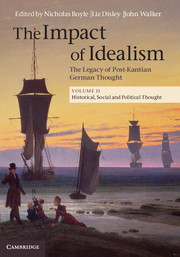Book contents
- Frontmatter
- Contents
- List of Contributors
- Acknowledgements
- List of Abbreviations
- Introduction: Idealism in historical, social and political thought
- 1 From transcendental idealism to political realism
- 2 The public of the intellectuals – from Kant to Lyotard
- 3 Idealism and the idea of a constitution
- 4 German Idealism and Marx
- 5 Ethos, nature and education in Johann Erich von Berger and Friedrich Adolf Trendelenburg
- 6 The concept and philosophy of culture in Neo-Kantianism
- 7 After materialism – reflections of Idealism in Lebensphilosophie: Dilthey, Bergson and Simmel
- 8 ‘Rationalisation’, ‘reification’, ‘instrumental reason’
- 9 Freedom within nature: Adorno on the idea of reason's autonomy
- 10 German neo-Hegelianism and a plea for another Hegel
- 11 Idealism and the fascist corporative state
- 12 Love and recognition in Fichte and the alternative position of de Beauvoir
- 13 Hegel's concept of recognition and its reception in the humanist feminism of Simone de Beauvoir
- 14 Giving an account of oneself amongst others: Hegel, Judith Butler and social ontology
- 15 Idealism in the German tradition of meta-history
- Bibliography
- Index
- References
11 - Idealism and the fascist corporative state
Published online by Cambridge University Press: 05 December 2013
- Frontmatter
- Contents
- List of Contributors
- Acknowledgements
- List of Abbreviations
- Introduction: Idealism in historical, social and political thought
- 1 From transcendental idealism to political realism
- 2 The public of the intellectuals – from Kant to Lyotard
- 3 Idealism and the idea of a constitution
- 4 German Idealism and Marx
- 5 Ethos, nature and education in Johann Erich von Berger and Friedrich Adolf Trendelenburg
- 6 The concept and philosophy of culture in Neo-Kantianism
- 7 After materialism – reflections of Idealism in Lebensphilosophie: Dilthey, Bergson and Simmel
- 8 ‘Rationalisation’, ‘reification’, ‘instrumental reason’
- 9 Freedom within nature: Adorno on the idea of reason's autonomy
- 10 German neo-Hegelianism and a plea for another Hegel
- 11 Idealism and the fascist corporative state
- 12 Love and recognition in Fichte and the alternative position of de Beauvoir
- 13 Hegel's concept of recognition and its reception in the humanist feminism of Simone de Beauvoir
- 14 Giving an account of oneself amongst others: Hegel, Judith Butler and social ontology
- 15 Idealism in the German tradition of meta-history
- Bibliography
- Index
- References
Summary
Corporatism, Idealism and juridical science
This chapter will be concerned with a small but significant part of twentieth-century Italian legal history: the doctrine of corporatism that developed in Italy under the influence of Idealism. Prompted by the fascist regime, the corporatist system was conceived as a specifically Italian ‘third way’. On the one hand, it was meant to combine private property and private economic enterprise with the possibility of various kinds of public intervention into the economy. On the other hand, it was intended to support the establishment of a structure of power capable of reconciling, in a sharply authoritarian fashion, the supremacy of the state with the acknowledgement of the institutional legitimacy of the main expressions of the new mass society (political parties, trade unions, productive forces). The development of the corporatist system came in three phases. The first was the trade-union phase, which focused on the state's recognition of unions of both workers and employers. This aimed at abolishing both trade union pluralism and the free economy: only fascist unions were recognised, and strikes and lockouts were prohibited and severely prosecuted. The second phase was the properly corporatist one. It began in 1934, when corporations were instituted; these were state-related bodies resulting from the combination of elements from trade unions, the public administration and the Fascist Party. They were the institutions in charge of managing the relations between the state and economic, political and social forces – and, therefore, the fulcrum of the new fascist organisation of power. In fact, however, their concrete activity was quite modest. The third phase of the development of the system was the institution, in 1939, of the House of Fasci and Corporations (Camera dei Fasci e delle Corporazioni), which formally ratified the suppression of the elections of deputies. The members of the House, in fact, were not elected; rather, they owed their membership to their being in charge of other bodies of the fascist state (the party, trade unions, corporations and others).
- Type
- Chapter
- Information
- The Impact of IdealismThe Legacy of Post-Kantian German Thought, pp. 260 - 276Publisher: Cambridge University PressPrint publication year: 2013
References
- 1
- Cited by

